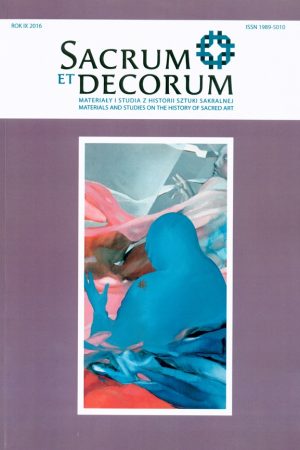Włodzimierz Borowski – a desymboliser of images
Keywords:
Włodzimierz Borowski; Antoni Michalak; the “Zamek”; de-symbolisation of pictures; heterology; religious painting; elevation; matter painting; informelAbstract
The article addresses the issue of the early period of Włodzimierz Borowski’s artistic development which coincided with his membership in the Zamek group. The pictures under discussion, distinguished by some earmarks of the style typical of informel finding purchase in the post-Stalinist thaw period in Poland, have been presented here in relation to the tradition of religious painting. This particular lineage of tradition was at that time championed by Antoni Michalak, who conducted draughtsmanship classes at the Catholic University of Lublin. However, these religious reminiscences were not along the lines of straightforward depiction in keeping with the tenets of sublimation and solemn elevation, but to the contrary. Borowski, committing himself to the pursuit of “matter painting”, accentuated degradation and dissolution of form, and his artistic credo is interpreted here within the framework of Yvas-Alain Bois’s heterology. This researcher, professing his subscription to the conceptual instruments advanced by Georges Bataille, demonstrated the dialectical process gravitating towards the obliteration of defined form among the practitioners and followers of the informel movement. The religious scenes insinuated by the titles bear testimony to a radical redefinition of the symbological conception of image and its departure in the direction of formless matter. The reinterpretation of those motifs signified an attempt to ride roughshod over a picture surface through the application of solid matter and decomposition of image; in the aftermath of that violation, the re-imagined drama bore no resemblance to the traditional solemn religious scenes and was completely subsumed by the disintegrating syntax of the image. Borowski’s liberalisation in the realm of form, which was correlated to the artistic idiom of the post-Stalinist informel movement, may be perceived as not only a profound rejection of the social-realist straitjacket but also as a comprehensive program for a polemic on the truth residing in pictures.Downloads
Downloads
Published
How to Cite
Issue
Section
License
Copyright (c) 2016 Sacrum et Decorum

This work is licensed under a Creative Commons Attribution-NonCommercial-NoDerivatives 4.0 International License.
In line with the Open Access policy, authors retain full copyright to their articles – without restrictions.
Authors can deposit their articles in a repository of their choice.


